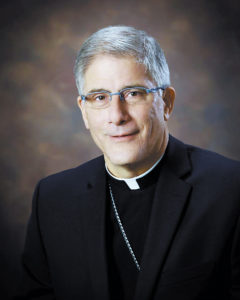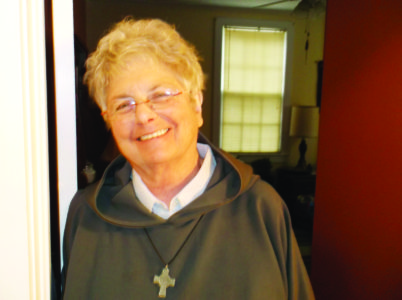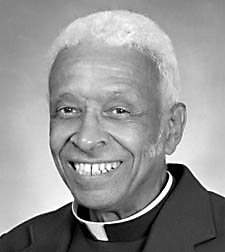
Obispo Joseph R. Kopacz
Por Obispo Joseph Kopacz
La Navidad es un regalo que se sigue dando, no solo por un día, sino por una OCTAVA de ocho días y una temporada de 19 días desde el Bautismo del Señor. Así que, por favor, canten sus himnos navideños hasta la Fiesta de la Epifanía el 6 de enero.
Las siguientes citas están tomadas de reflexiones diarias, durante la OCTAVA de Navidad, que reflejan una sabiduría inspirada por años.
El Dia de Navidad, “Cristianos, reconozcan su dignidad”, Papa San León Magno.
“Querido, hoy ha nacido nuestro Salvador; alegrémonos. La tristeza no debe tener lugar en el cumpleaños de la vida. El miedo a la muerte ha desaparecido; La vida nos trae alegría con la promesa de la felicidad eterna … Nadie está excluido de esta alegría; Todos comparten la misma razón para regocijarse. Deja que el santo se regocije al ver la palma de la victoria en la mano. Deja que el pecador se alegre al recibir la oferta de perdón. Deja que el pagano tome coraje cuando sea convocado a la vida “.
“El Armamento del Amor”, San Fulgencio de Ruspe.
“Nuestro rey, a pesar de su majestad exaltada, vino con humildad por nuestro bien; sin embargo, no vino con las manos vacías. Él trajo a sus soldados un gran regalo que no solo los enriqueció, sino que además los hizo invencibles en la batalla, ya que era el regalo del amor que se debía llevar a hombres y mujeres para compartir su divinidad. Él dio su recompensa, sin ninguna pérdida para sí mismo. De una manera maravillosa, convirtió en riqueza la pobreza de sus fieles seguidores, mientras que permanece en posesión de una riqueza inagotable”.
“La vida misma fue revelada en la carne”, San Agustín.
“Te proclamamos lo que hemos visto y oído”. Evangelio de Juan. Asegúrate de comprender el significado de estas palabras. Los discípulos vieron a nuestro Señor en carne, cara a cara; Oyeron las palabras que habló y, a su vez, nos proclamaron el mensaje. Así, también hemos oído, aunque no hemos visto. ¿Somos menos favorecidos que aquellos que tanto vieron y oyeron? Si fuera así, ¿por qué Juan debería agregar? – ¿debe usted tener comunión con nosotros? Ellos vieron, y nosotros no hemos visto; sin embargo, tenemos comunión con ellos, porque nosotros y ellos compartimos la misma fe. ‘Y nuestra comunión es con Dios el Padre y Jesucristo su Hijo. Y escribimos esto para completar su alegría, completa en esa comunión, en ese amor y en esa unidad.’
“No pueden hablar y, sin embargo, dan testimonio de Cristo”. San Quodvultdeus.
Un niño pequeño ha nacido, que es un gran rey. Los sabios son llevados a él desde lejos. Ellos vienen a adorar a uno que se encuentra en un pesebre y, sin embargo, reina en el cielo y en la tierra. Cuando ellos hablan de uno que nace rey, Herodes es perturbado. Para salvar su reino, decide matarlo, aunque si tuviera fe en el niño, él mismo reinaría en paz en esta vida y para siempre en la vida venidera. ¿Por qué tienes miedo, Herodes, cuando escuchas el nacimiento de un rey? Él no viene para expulsarte, sino para conquistar al diablo. Pero como no entiendes esto, estás perturbado y, con rabia, y para destruir a un niño que buscas, demuestras tu crueldad con la muerte de otros tantos niños … Los niños aún no pueden hablar y dan testimonio de Cristo. No pueden usar sus extremidades para participar en la batalla, sin embargo, ya llevan la palma de la victoria.
“En la plenitud de los tiempos apareció la plenitud de la humanidad”, Abad San Bernardo.
¿Cómo pudo haber mostrado su misericordia más claramente que asumiendo nuestra condición? Por nuestra causa, la Palabra de Dios se hizo como hierba. ¿Qué mejor prueba podría haber dado de su amor? La La escritura dice: Señor, ¿qué es la humanidad que tienes en mente de él? ¿Por qué su corazón está con él? La Encarnación nos enseña cuanto Dios nos cuida y qué piensa y siente de nosotros. Debemos dejar de pensar en nuestros propios sufrimientos y recordar lo que él ha sufrido. Pensemos en todo lo que el Señor ha hecho por nosotros, y luego nos daremos cuenta de cómo su bondad aparece a través de su humanidad. Cuanto más que Él se rebajaba por mí, más querido era para mí. Él nos ha dado la más maravillosa prueba de su bondad al agregar a la humanidad a su propia naturaleza divina
¿Cómo pudo haber mostrado su misericordia más claramente que asumiendo nuestra condición? Por nuestra causa, la Palabra de Dios se hizo como hierba. ¿Qué mejor prueba podría haber dado de su amor? La Escritura dice: Señor, ¿qué es la humanidad que tienes en mente de él? ¿Por qué su corazón está con él? La Encarnación enseña cuánto nos cuida Dios y qué piensa y siente de nosotros. Debemos dejar de pensar en nuestros propios sufrimientos y recordar lo que él ha sufrido. Pensemos en todo lo que el Señor ha hecho por nosotros, y luego nos daremos cuenta de cómo su bondad aparece a través de su humanidad. Cuanto más se rebajaba por mí, más querido era para mí. Él nos ha dado la más maravillosa prueba de su bondad al agregar a la humanidad a su propia naturaleza divina.
“La Palabra quitó nuestra naturaleza de María” San Agustín.
El apóstol nos dice: ‘El Verbo tomó para sí a los hijos de Abraham, y por eso tuvo que ser como sus hermanos en todas las cosas’. Jesús tuvo entonces que tomar un cuerpo como el nuestro. Esto explica el hecho de la presencia de María; ella debe proporcionarle un cuerpo propio para ser ofrecido por nuestro bien. La Escritura registra su parto y dice: Ella lo envolvió en pañales. Sus pechos, que le daban de comer, fueron llamados bendecidos. Se ofreció sacrificio porque el niño era su primogénito. Gabriel usó un lenguaje cuidadoso y prudente cuando anunció su nacimiento. Gabriel no habló de lo que nacería en ti para evitar la impresión de que un cuerpo sería introducido en su vientre desde afuera; habló de “lo que nacerá de ti” para que podamos saber por fe que su hijo se originó dentro y desde ella.




